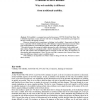1082 search results - page 35 / 217 » Learning the Semantic Meaning of a Concept from the Web |
RIAO
2007
2007
From Layout to Semantic: a Reranking Model for Mapping Web Documents to Mediated XML Representations
13 years 9 months ago
Many documents on the Web are formated in a weakly structured format. Because of their weak semantic and because of the heterogeneity of their formats, the information conveyed by...
WEBNET
2000
13 years 9 months ago
2000
: Web usability is a common term used in discussions of WWW (World Wide Web). This is definitely important, as more and more web sites are frequently visited and have great impact ...
MM
2006
ACM
14 years 1 months ago
2006
ACM
We introduce the challenge problem for generic video indexing to gain insight in intermediate steps that affect performance of multimedia analysis methods, while at the same time...
EXPERT
2008
13 years 7 months ago
2008
Natural language technologies have been long envisioned to play a crucial role in transitioning from the current Web to a more "semantic" Web. If anything, the significa...
SEMCO
2007
IEEE
14 years 2 months ago
2007
IEEE
Knowledge-based natural language processing systems learn by reading, i.e., they process texts to extract knowledge. The performance of these systems crucially depends on knowledg...

